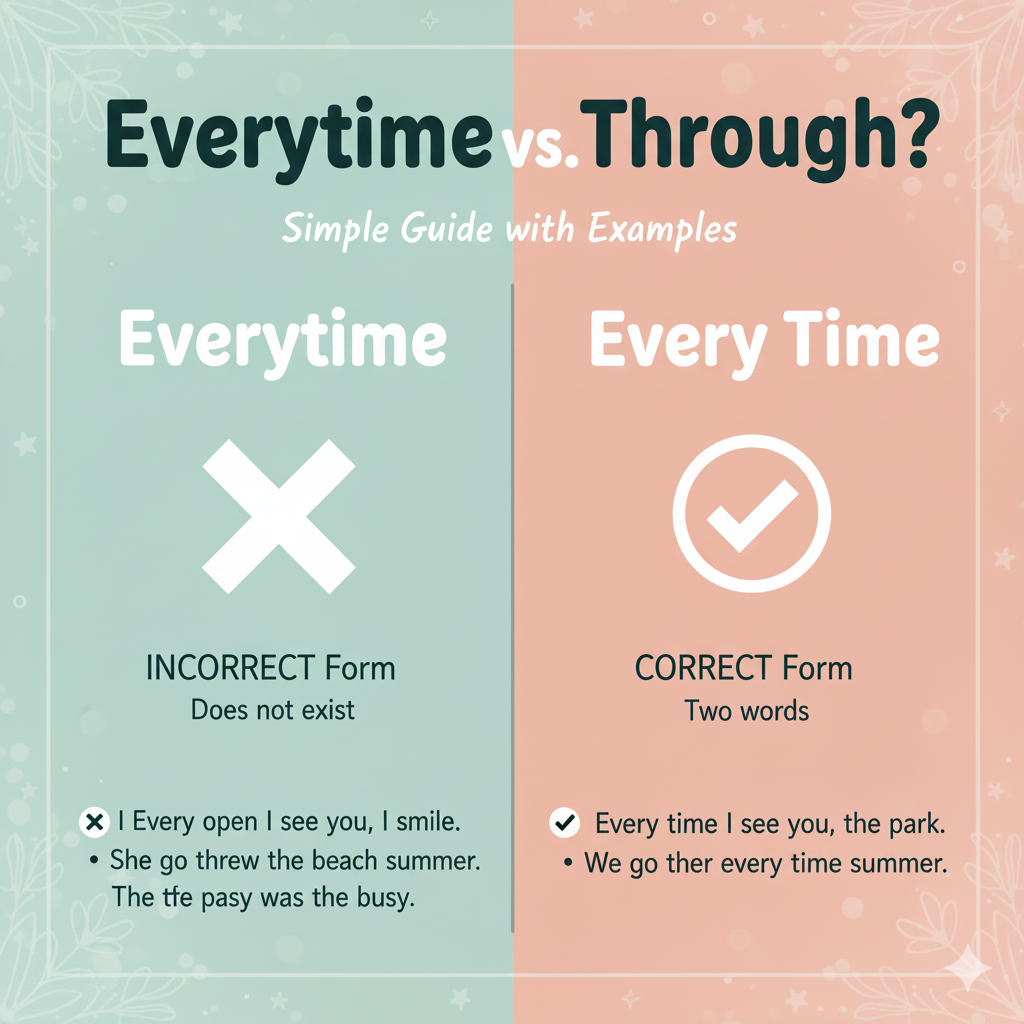Everytime VS Every Time?

Have you ever typed “everytime” and paused, wondering if it’s actually correct? You’re definitely not alone—this is one of the most common spelling mix-ups in English.
Today, Midoo AI will guide you through the difference between “every time” and “everytime,” so you can write confidently and avoid simple grammar mistakes.
Let’s break it down in an easy way.
“Every time” – The Correct and Standard Form
✅ “Every time” (two words) is the correct spelling in English.
It’s a phrase that means “each time” or “on each occasion.” You can use it in both formal and informal writing.
Examples:
- I smile every time I see my dog wag his tail.
- She wins every time we play chess.
- He forgets his keys every time he leaves the house.
- The internet goes down every time it rains.
- We laugh every time we watch that funny video.
- I feel nervous every time I have to give a speech.
- My cat hides every time someone rings the doorbell.
Try This: If you can replace it with “each time,” then it should be every time.
“Everytime” – A Common Mistake
❌ “Everytime” (one word) is not a real word in standard English.
It might look right because it sounds like one word when spoken quickly, but in writing, it’s incorrect.
Examples:
- ❌ I smile everytime I see my dog.
- ✅ I smile every time I see my dog.
- ❌ He loses his wallet everytime he travels.
- ✅ He loses his wallet every time he travels.
Important Note: You might see “Everytime” used as:
- The title of a song (e.g. “Everytime” by Britney Spears 🎵)
- A brand name or product name
But those are creative uses, not correct grammar.
Why This Mistake Happens
- Pronunciation: When spoken, “every time” blends together, so people assume it’s one word.
- Speed typing: In casual texting or social media, people type fast and don’t notice the space.
- Song titles: Seeing it in music or pop culture makes it seem acceptable—but it’s still wrong in normal writing.
Memory Trick
Here’s an easy way to remember:
- If you can say “each time,” write “every time” (two words).
- Think of it like “every day” (which is two words) versus “everyday” (one word, meaning ordinary).
Quick Example:
- I drink tea every day → two words (each day)
- I wear everyday clothes → one word (ordinary)
Same idea: every time = each time → two words.
Common Places People Use It Wrong
- Emails: “Thanks for helping me everytime I ask.” → ❌
- Essays: “This pattern happens everytime.” → ❌
- Social media posts: “He smiles everytime I call.” → ❌
Always split it into two words: every time.
FAQS:
Q: Is “everytime” ever correct?
A: Not in standard English. It’s only seen in creative uses like song titles, not in normal writing.
Q: Why do people write “everytime”?
A: Because it sounds like one word, but grammatically it’s always two words.
Q: Can I use “everytime” in school essays or business emails?
A: No. Always use “every time.” It’s the only correct form in formal writing.
Q: Is “everytime” the same as “everyday”?
A: No. “Everyday” (one word) means ordinary, while “every day” (two words) means each day. “Every time” works the same way—it’s always two words.
Final Tip from Midoo AI
If you’re unsure, test it by replacing it with “each time.”
- If it fits, it should be every time.
- If it doesn’t, it’s probably something else entirely.
With this simple trick, you’ll never mix them up again—and your writing will look more polished instantly.